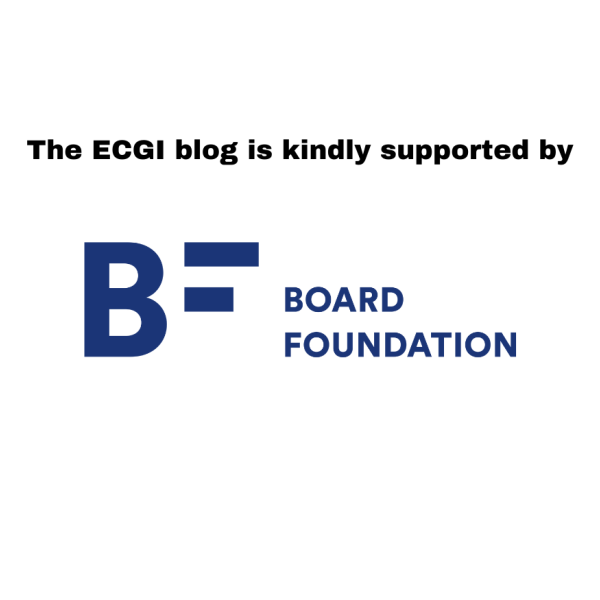ECGI Blog
The ECGI Blog serves as a prominent global voice on corporate governance and corporate responsibility. By featuring commentaries and analyses from the ECGI network and beyond, the blog aims to enhance the wider understanding of leading academic research, sparking and influencing global debate.

Explore popular series' within the ECGI Blog
Discover all of our Blog Series'
- Responsible Capitalism
- Governance and Climate Change
- Corporate Purpose
- Technology & Governance
- Corporate Sustainability Due Diligence
- Corporate Governance in Asia
- Codes and Principles
- ESG
- Banking Crisis 2023
- Private Equity and Venture Capital
- Sustainability Standards and Reporting
- Biodiversity
- Short-termism
- Diversity
- Responsible Investment
- Russia-Ukraine War
- COVID-19
- Policy Watch
- Dual Class
480 Blogs
Our approach
In contrast to other blogs which already collect and disseminate posts on new research papers in a very effective manner, the ECGI Blog focuses on selected themes with global interest, seeking to identify audiences that may be underserved by other platforms. As a result, the Blog primarily invites contributions from selected individuals from within and outside academia, based on their expertise, regional insight, and influence.
The Blog publishes a regular newsletter (subscribe here), along with a quarterly roundup and/or special editions from time to time, depending on developments.
In addition to inviting individuals to contribute, we are also open to receiving unsolicited submissions in the following publication categories:
- Academic pieces, which report on the results of new research in corporate governance and stewardship (up to 800 words*)
- Opinion pieces, which advance a personal viewpoint on a current issue or debate in corporate governance and stewardship (up to 800 words*)
- Topical pieces, which report on recent notable advancements, developments, and current events in Corporate Governance and stewardship (up to 800 words*)
* Word limit exceptions may apply at the Editors' discretion.
If the Editors would like to include your submission, or discuss edits, you will be contacted usually within 10 working days. If your submission is not selected, you will not be contacted.
Who can submit articles to the blog?
Submissions are welcome in priority from all ECGI Fellows and Research members, maintaining the high academic standards associated with ECGI. Further submissions will be accepted from other ECGI member categories and non-members with relevant expertise in corporate governance and stewardship. Submissions of strong current interest or that fit with the scheduled themes of the Blog may have priority. The themes are chosen at the discretion of the Editors and may or may not be disclosed in advance of Blog editions. Commercial posts and submissions from undergraduates are not accepted.
Before submitting, please review the below submissions guidelines and style guide carefully.
General guidelines
- Please submit pieces that are well-researched and well-written and work as standalone pieces, even if they are part of, or summarise a larger work body.
- Submissions should be the original work of the author. Co-authors should be included when the piece summarises a co-authored paper.
- We accept submissions even if they have been previously published elsewhere (please provide us a link to the original publication), however priority will be given to unpublished articles.
- If previously published, we ask the authors to seek permission from the original publishers before reproducing content on our platform.
- The ECGI Blog doesn't require exclusivity if one publishes there first. However, please ensure that the original article is referenced with a hyperlink in all subsequent publications.
- Submissions should be in English.
- Headlines should be kept brief, ideally no more than 10 words and/or less than 80 characters, grabbing a reader’s attention. Please ensure that the title clearly communicates the topic and conveys the piece’s essence to the reader.
- The ECGI Blog does not accept pieces that come across as promotional or include appropriate citations. We ask our authors to disclose any financial / sponsorship relationships they have with companies or organisations cited in the proposed article.
- Any conflict of interest should be indicated in the piece itself or the submission details.
- Submissions should not contain content that could be deemed offensive, abusive, disrespectful, or potentially defamatory.
Referencing
- We encourage the use of hyperlinks in your text to guide readers to online sources (as appropriate), particularly in contentious statements. It is recommended that no more than ten hyperlinks per piece be included.
- If you are citing an external source that is not accessible online, please make sure that your references are in the American Psychological Association (APA) format and brackets or parentheses. Please visit the https://apastyle.apa.org/ for more information.
- We ask our authors to avoid using footnotes; instead, insert the content directly into the document, preferably with Hyperlinks.
Additional Guidelines
- The ECGI Blog uses inclusive language that acknowledges diversity, conveys respect to all people, is sensitive to differences, and promotes equal opportunities. Content submitted should make no assumptions about any reader's beliefs or commitments; except for academic findings on the topic of diversity, should not contain derogatory phrases or statements on the grounds of age, gender, race, religion, ethnicity, culture, sexual orientation, disability, or health condition; and use inclusive language throughout.
- To obtain a sense of what kind of subjects are welcome, please review the ECGI Blog page for a list of suggested themes. Contributors may also review the Topics section on the ECGI website.
- The Editors of the ECGI Blog have full discretion in deciding whether to approve a submission for publication.
- These guidelines are intended as a reference point to help define the relevant vocabulary but are not exhaustive or definitive.
- In the absence of an ECGI profile URL (member page), it is recommended that authors include a short biography (100 words max). It should include full name, institutional affiliation, and role, and your work's nature/focus should be included in the biography. We also ask that you provide us with a link to your LinkedIn page and/or professional website, as well as any pertinent social media handles (if possible) where readers can follow up with you for any extra information.
- Readers and contributors should be familiar with ECGI's Terms of Use and Privacy Policy.
Style Guide
GENERAL
We recommend taking advantage of the informal format of a blog article to explore your opinions and insight as much as possible. Unlike academic writing which is written for journal referees and carefully crafted to avoid reaching too far with particular research findings, a blog essay should be more nuanced, exploring your views and including informed judgements. Please feel free to be as measured or provocative as necessary while expressing your insight and expertise, using supporting references as usual (a small number of hyperlinks). Responses to your article will be encouraged and collected for possible future inclusion on the Blog. The rest of this page contains more practical guidance, if needed.
Content should be succinct and easily comprehensible for a range of audiences. The tone of the blog is professional and serious. With the exception of concluding comments, repetition should be avoided. Content should be punctuated with short, clear sentences, making it possible to read in under five minutes. Please ensure that the article is well structured and has a clear message. Originality is also considered favourably. Submissions written with a salacious, promotional, commercial, rambling or baseless tone will not be accepted.
GRAMMAR AND SYNTAX
Spelling
The content of the ECGI blog is published in English. The use of both UK and US spelling is permitted as long as the choice is consistent throughout the article. Please proof-read and spell-check your article before submitting it. Articles with multiple spelling or grammatical errors might be automatically declined.
Abbreviations
Avoid abbreviations to the extent that it is possible. If used, they should be commonly recognised by all audiences. It is possible to label an abbreviated term or acronym in your article by spelling it in full once, with the short version in parentheses. Some additional guidelines:
- 'Example' may be abbreviated to e.g. 'Et cetera' may be abbreviated to etc.
- Currencies should be abbreviated to the three-letter international standard (ISO 4217) (e.g. EUR / GBP / USD)
- Units of measurement and time are acceptable abbreviations (e.g. kg, kph, mph, lb, km, mm, am, pm).
- Dates should be easily discernible to all audiences. We therefore recommend the format DD MONTH YYYY.
- Countries should be consistently named throughout the article. In the case of the United Kingdom, we recommend spelling it in full the first time it appears and abbreviating it to 'the UK' thereafter. Similarly, for the European Union (EU), the United States (US), and others.
- In the case of political roles, in a UK context, MP should be used only after spelling out 'Member of Parliament' in full. Members of the European Parliament are MEPS and never Euro-MPs.
- The word 'Professor' is preferred to 'Prof.' although both are acceptable as long as the selection is consistent. Doctor, in the case of an academic prefix, should always be abbreviated (Dr.).
- In all cases (regardless of marital status or seniority), the prefix Ms. should be used in place of Mrs. or Miss.
Acronyms
If used, acronyms should be commonly recognised by all audiences. It is possible to label an abbreviated term or acronym in your article by spelling it in full once, with the short version in parentheses. Some exceptions are made for widely known organisations that are universally, perhaps better recognised by their acronym (e.g. NATO, BBC, UNESCO, OECD, NGO, IMF).
Ampersands
The ampersand symbol should only be used if it is part of a name or labelled grouping, for example, 'Ernst & Young', 'Faculty of Arts & Design'.
Punctuation
Please pay close attention to your punctuation. Commas are encouraged to break long sentences, but sentences should be short enough to only require one. The 'Oxford comma', which precedes the word 'and' is acceptable as long as it is used consistently throughout the article.
The use of ‘it is’ is preferred to ‘it’s’. Similarly, ‘it will be’ (not 'it won’t be'), ‘was not’ (not 'wasn’t'), ‘is not’ (not 'isn’t'), and so on. Please note that "its" is a possessive pronoun and should be used accordingly (example: ‘ECGI has a blog and its style guide is very lenient’).
Capitalisation
Please pay attention to the capitalisation of proper names (people, organisations, goods, etc.), positions/job titles, subtitles, headlines, and some scientific names. Example: The world is not capitalised, but World War II is capitalised. Days of the week and months should be capitalised. Seasons are not capitalised unless they are in a title (e.g. The Winter Olympics). Only proper nouns and titles should be capitalised.
FORMATTING
Bold: The use of bold text is not encouraged and should be used primarily for sub-headings.
Italics: Italics should be used for names of books, journals, and newspapers, such as 'The New Yorker'. Foreign words should not be italicized except for Latin expressions and acronyms (ad hoc, bona fide). It is not necessary to italicise the abbreviations: e.g. and etc.
Underlined text: As users might confuse it with hyperlinks, underline text is not permitted.
Hyphens: Hyphens should be used to join two words when they appear before a noun (to make a compound adjective) and qualify the next, for example, 'mid-summer ceremony'.
Headlines: Headlines should be kept as short as possible (max. 80 characters).
Footnotes: The use of hyperlink references is encouraged instead of footnotes.
Colour: Articles are published in black font. Highlighted text is not permitted.
Hyperlinks: Hyperlinks are used to guide readers to online sources (references). It is recommended that no more than five links be included. Links to commercial content will be removed.
Numbers: With some exceptions, such as for lists or titles, words should be used for the numbers one to ten, and numerals used for 11 upwards, plus percentages and money of any amount.
Spacing: Only one space between sentences is required. The use of paragraphs to break large blocks of text is encouraged, with one line space between paragraphs.
Quotation marks: Both US and UK rules are acceptable as long as the selection is consistent throughout the article. In general, single quotation marks are always preferred except for directly quoting what someone said. Example: The event's theme was 'Corporate Governance', and the first speaker said, "I'm thrilled to be here."
INCLUSIVE LANGUAGE
In general, articles should be written in the third person, with minimal use of the words ‘I, we, my, our and you’ (example: ‘the evidence shows’, rather than ‘our evidence shows’). This is a preference and will not be enforced. Some articles, especially in the case of opinion pieces may read more naturally in the first person.
Referring to others, the use of 'they', 'their' and 'them' is preferred instead of 'he, she, his, her, him, her). If in doubt the person’s name or role could be referenced (example: ‘The CEO received…’, ‘Professor Becht stated…’).
Please use inclusive terms such as ‘Chair’ (not Chairman) and be alert for others. Authors should use language that acknowledges diversity, conveys respect to all people, is sensitive to differences, and promotes equal opportunities. Content should make no assumptions about any reader's beliefs or commitments; contain phrases or statements on the grounds of age, gender, race, religion, ethnicity, culture, sexual orientation, disability, or health condition. The use of socio-economic terminology to define, explain or analyse a particular class should also be considered. Examples: Homelessness, people experiencing homelessness (not ‘the homeless’), people living below the poverty line (not ‘the poor’).
Swear words and profanities are not permitted.
More answers and tips
1. How do I make a submission?
Please complete the online submissions form.
2. How long should the pieces be?
The recommended length is up to 800 words. However, longer pieces may be justified and accepted.
3. What kind of content is accepted or preferred?
In addition to inviting individuals to contribute, we are also open to receiving unsolicited submissions in the following publication categories:
- Academic pieces, which report on the results of new research in corporate governance and stewardship (up to 800 words*)
- Opinion pieces, which advance a personal viewpoint on a current issue or debate in corporate governance and stewardship (up to 800 words*)
- Topical pieces, which report on recent notable advancements, developments, and current events in Corporate Governance and stewardship (up to 800 words*)
While there are no preferences for the publication categories, the number of pieces published on the same subject or opinion may be limited. The Editors may decline submissions if they are too similar to previous posts.
4. What tone and style should I use in my article?
We recommend taking advantage of the informal format of a blog article to explore your opinions and insight as much as possible. Unlike academic writing which is written for journal referees and carefully crafted to avoid reaching too far with particular research findings, a blog essay should be more nuanced, exploring your views and including informed judgements. Please feel free to be as measured or provocative as necessary while expressing your insight and expertise, using supporting references as usual (a small number of hyperlinks).
The ECGI tone is formal and respectful but strives for a discourse that is both conversational and concise. Submissions should ideally stimulate intelligent debate and thought-provoking comment from readers. With the exception of concluding comments, repetition should be avoided. Content should be punctuated with short, clear sentences, making it possible to read in under five minutes. The articles are intended for multiple audiences of both academic and non-academic backgrounds. Please ensure that the article is well structured and has a clear message. Submissions written with a salacious, promotional, commercial, rambling or baseless tone will not be accepted. Please refer also to our Style Guide.
5. What is the review process for posts, and when will I know if my submission is accepted?
After submission, the editorial team will review articles based on the piece's relevance, expertise, quality, evidence, and general suitability.
If the Editors would like to include your submission, or discuss edits, you will be contacted usually within 10 working days. If your submission is not selected, you will not be contacted.
Feedback and/or a reason for the decline will not be provided. In some cases, acceptance may be conditional on making some revisions to the article. However, the editors' availability is limited and therefore only minor revisions may be considered. The article will be not be considered if it requires several revisions.
6. Where does my article appear once published?
Depending on your article's primary theme, it will appear on the ECGI website, in the Blog section, in the relevant theme folder (ordered by most recent). It will also be included in the Blog newsletter that will circulate new posts to the ECGI network (blog subscribers only). You will be notified when your article is published on the website.
7. Can I submit my article elsewhere after publishing it on the ECGI Blog?
Yes, after you submit your article, you may still publish it elsewhere, but please ensure that the original article is referenced with a hyperlink in all subsequent publications.
8. I have already published my article on another platform. Can I still submit it to the ECGI Blog?
Submissions may be accepted even if they have been previously published elsewhere (please provide a link to the original publication), however priority will be given to unpublished articles. We ask the authors to seek permission from the original publishers before reproducing content on our platform. This should be indicated in the submissions form.
9. My submission has been rejected. Can I receive feedback on my submissions?
The editorial team is not obliged to provide feedback. Decisions are final and cannot be appealed. Articles with significant revisions may be resubmitted for fresh consideration.
10. My submission has not been accepted. Can I submit another one?
Yes, if we have passed on a blog post that you have submitted, please feel free to submit again with another idea or a different angle. Repeated decline decisions may lead to ineligibility for submission.
11. How do I subscribe to the ECGI Blog?
Additional tips:
Be concise: Try to keep posts under 800 words, which is why we recommend avoiding lengthy analysis and repetition.
Use hyperlinks: Highlight appropriate sources and links with hyperlinks instead of footnotes. If there is no link available, please include the citation in parentheses.
Use headers and lists: Divide your content by using subheaders; this makes it easier for your readers to navigate your piece. It can also be useful to combine a series of items into bulleted or numbered lists.
Avoid clickbait headlines: Writers are encouraged to avoid headlines that might be considered sensationalist, hyperbolic, or that could be read as spam. Please remember that post titles have a maximum of 10 words.
Double-check for potential copyright issues: authors must ensure that their content and images do not violate any copyright or other intellectual property rights.
CTAs are not allowed: Links to the author's profile, organisation, or business are included under his profile and at the end of the piece. Please avoid including calls to action altogether.











